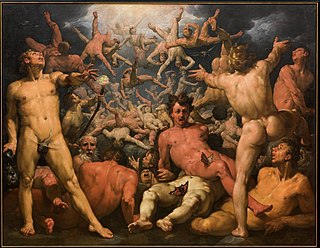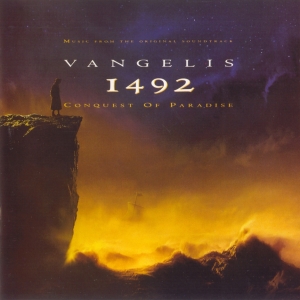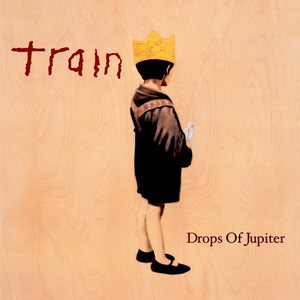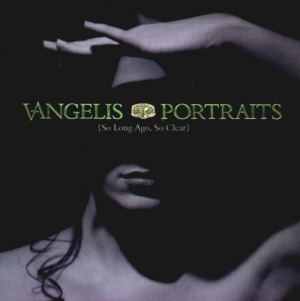
Evangelos Odysseas Papathanassiou, known professionally as Vangelis, was a Greek musician, composer, and producer of electronic, progressive, ambient, and classical orchestral music. He composed the Academy Award-winning score to Chariots of Fire (1981), as well as for the films Blade Runner (1982), Missing (1982), Antarctica (1983), The Bounty (1984), 1492: Conquest of Paradise (1992), and Alexander (2004), and the 1980 PBS documentary series Cosmos: A Personal Voyage by Carl Sagan.

Jupiter is the fifth planet from the Sun and the largest in the Solar System. It is a gas giant with a mass more than 2.5 times that of all the other planets in the Solar System combined and slightly less than one-thousandth the mass of the Sun. Its diameter is eleven times that of Earth, and a tenth that of the Sun. Jupiter orbits the Sun at a distance of 5.20 AU (778.5 Gm), with an orbital period of 11.86 years. It is the third-brightest natural object in the Earth's night sky, after the Moon and Venus, and has been observed since prehistoric times. Its name derives from that of Jupiter, the chief deity of ancient Roman religion.

In Greek mythology, the Titans were the pre-Olympian gods. According to the Theogony of Hesiod, they were the twelve children of the primordial parents Uranus (Sky) and Gaia (Earth), with six male Titans—Oceanus, Coeus, Crius, Hyperion, Iapetus, and Cronus—and six female Titans, called the Titanides or Titanesses—Theia, Rhea, Themis, Mnemosyne, Phoebe, and Tethys.

Angela Gheorghiu is a Romanian soprano, especially known for her performances in the operas of Puccini and Verdi.

1492: Conquest of Paradise is a 1992 music score to the film of the same name by Greek electronic composer and artist Vangelis. The film, a recount of the voyage to America in 1492 by Christopher Columbus, was directed by Ridley Scott, for whom Vangelis had previously composed the music score for Blade Runner, in 1982. The album and the single "Conquest of Paradise" enjoyed a revival in 1995 for various reasons and broke many sales records.

Themes is a compilation album of works by Greek electronic composer and artist Vangelis released in July 1989. It featured some previously released tracks from Vangelis's other albums, as well as some pieces from movie soundtracks that had not previously been released.

Drops of Jupiter is the second studio album by American pop rock band Train, released on March 27, 2001. The album's title is derived from "Drops of Jupiter ", its lead single, which was a hit internationally and won the Grammy Award for Best Rock Song.

Blade Runner: Original Motion Picture Soundtrack is the soundtrack for Ridley Scott's 1982 science-fiction noir film Blade Runner, composed by Greek electronic musician Vangelis. It has received acclaim as an influential work in the history of electronic music and one of Vangelis's best works. It was nominated in 1983 for a BAFTA and Golden Globe for best original score. The score evokes the film's bleak futurism with an emotive synthesizer-based sound, drawing on the jazz scores of classic film noir as well as Middle Eastern texture and neo-classical elements.
Mythodea — Music for the NASA Mission: 2001 Mars Odyssey is a choral symphony by Greek electronic composer and artist Vangelis. It premiered as a single concert in Athens, Greece, in 1993 but a recording was only released in 2001 by Vangelis' then new record label Sony Classical, which also set up the NASA connection and promoted a new concert, this time with a worldwide audience.

Portraits is a 1996 compilation album of works by Greek electronic composer and artist Vangelis.

Hourglass is the second solo studio album by English singer Dave Gahan, released on 17 October 2007 by Mute Records. It received generally favourable reviews; most critics complimented its electronica sound, while some criticised it for sounding too similar to Gahan's group Depeche Mode.

Vangelis was a Greek musician, composer, and producer. He began his music career in the 1960s with the Greek progressive rock band Aphrodite's Child and in the 1970s began composing electronic music. He gained wide mainstream popularity after composing soundtracks to the films Chariots of Fire (1981) and Blade Runner (1982). His solo career discography consists of 23 studio albums, 26 compilation albums, 12 soundtrack albums, and roughly 29 singles. The majority of his film, documentary, theatre, and ballet & dance scores were not released or officially released. He also collaborated with Jon Anderson and as a duo, Jon and Vangelis, released 4 studio albums, 2 compilations, and 13 singles, and with Irene Papas released two studio albums.
JunoCam is the visible-light camera/telescope onboard NASA's Juno spacecraft that entered orbit around Jupiter in 2016. The camera is operated by the JunoCam Digital Electronics Assembly (JDEA). Both the camera and JDEA were built by Malin Space Science Systems. JunoCam takes a swath of imaging as the spacecraft rotates; the camera is fixed to the spacecraft, so as it rotates, it gets one sweep of observation. It has a field of view of 58 degrees with four filters.

Scott J. Bolton is an American theoretical and experimental space physicist. He is an associate vice president of the Southwest Research Institute Space Science and Engineering Division. His research area is planetary sciences with a focus on the giant planets and the origin of the solar system. Previously serving as a member of the Galileo and Cassini–Huygens missions, Bolton became the Principal Investigator of Juno, a New Frontiers program mission to Jupiter which began primary science in 2016.

The Collection is compilation album by Greek composer Vangelis, released on 23 July 2012.

Merry Christmas, Baby, is the first Christmas album by Rod Stewart and his 27th studio album overall, released on 30 October 2012. The album has proved to be a top 10 success in many countries including the UK, US, Canada and Australia. It was certified Platinum by the Recording Industry Association of America in November 2012 with over 1,000,000 copies sold in the US.

The Birth of the Milky Way, also sometimes known as The Origin of the Milky Way, is an oil-on-canvas painting by the Flemish artist Peter Paul Rubens, produced between 1636 and 1638 and featuring the Greco-Roman myth of the origin of the Milky Way. The painting depicts Hera (Juno), spilling her breast milk, the infant Heracles (Hercules) and Zeus (Jupiter) in the background, identifiable by his eagle and lightning bolts. Hera's face is modelled on Rubens' wife, Hélène Fourment. The carriage is pulled by peacocks, a bird which the ancient Greeks and Romans considered sacred to both themselves and to Hera/Juno, as a result of their ability to signal changes in weather through cries and hence their perceived connection to the gods.

Rosetta is a studio album by Greek composer and musician Vangelis, released on 23 September 2016 by Decca Records. It is dedicated to the Rosetta space probe mission, launched in 2004, being one of his several works which were inspired by space travel, or produced in collaboration with space missions (Mythodea). Rosetta received a Grammy Award nomination for Best New Age Album at the 59th Annual Grammy Awards.

Nocturne: The Piano Album is a studio album by Greek musician and composer Vangelis, released on 25 January 2019 on Decca Records. It is a solo piano album of 11 new tracks plus arrangements of various songs from his solo career.

The Gods We Can Touch is the fourth studio album by Norwegian singer-songwriter and record producer Aurora. It was released on 21 January 2022 by Decca and Glassnote Records. As in her other releases, Aurora worked with Magnus Skylstad and Askjell Solstrand, along with new collaborations with Jamie Hartman, Martin Sjølie and Matias Tellez on its production.


















